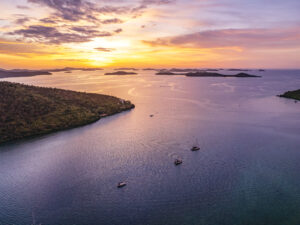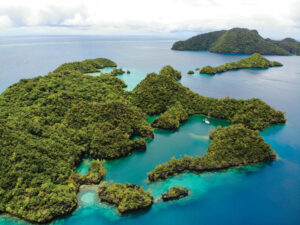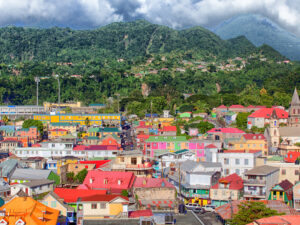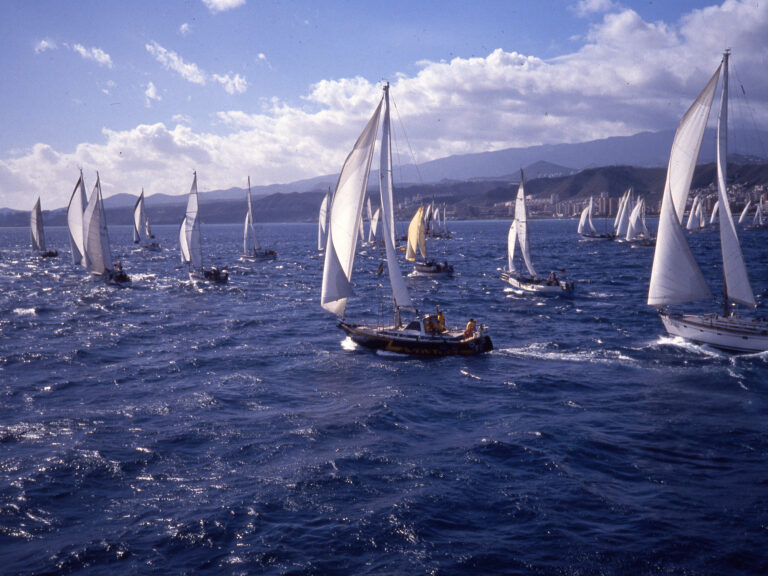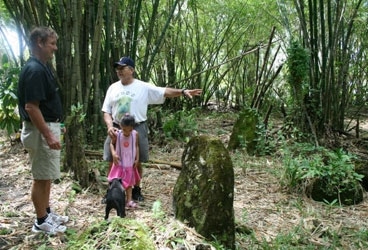
RHalvah guam 368
Guam holds the unfortunate distinction of having been under continuous, even if changing, foreign military rule for the longest period in recorded history. The Chamorro people watched Ferdinand Magellan drift in here starving to death in 1521. They helped the guy.
Big mistake? The results are not in, but the first 400 years looked awfully bleak. The grip of Spanish rule and Catholic evangelism almost choked the life out of the Chamorro culture. The coup de grace was supposed to be the burning on the beach of the last Chamorro proa, reputed to be the finest, fastest, most elegantly designed craft on Earth at the time. We are talking asymmetrical hulls offsetting the drag of the outrigger that flew past the lumbering European tanks at speeds in excess of 20 knots. Not bad for supposed jungle-bunnies!
What European dictates did not destroy, disease did. The Chamorro were nearly decimated. Nearly, for however thin, threads of Chamorro bloodline, language and culture survived, and are today the core of this island’s way of life.
On the same day the Japanese attacked Pearl Harbor, they also rolled into Guam, crushing thin American resistance. The natives cast their lot and loyalty with the Americans, in spite of the very real threat of brutal torture and death by an outraged Japanese administration. One American, George Tweed, escaped to the bush. After being smuggled from family to family, he eventually ended up on Guam’s northern tip on the ranch of Antonio Artero.
For two years the Japanese systematically searched for Tweed, but Mr. Artero fooled even his family, slipping off weekly to a hidden cave with the food and news that nourished the struggling escapee. When the American fleet appeared offshore for the reinvasion of Guam, Tweed, a signalman, flashed a message from the cliffs above his cave, and arranged to swim to safety. Had the invasion occurred two days later, Mr. Artero would have been beheaded, because his secret had somehow slipped out to the Japanese.
After the war Artero was awarded the Congressional Medal Of Freedom, then was later informed that his entire estate was to be appropriated for the then fledgling Anderson Air Force Base. This would have broken the back of most families and relegated them to the ranks of helpless victims or resentful radicals. But his is no ordinary family.
Graying, but still powerfully built, Franklin Artero, one of Antonio’s sons, picked Diana and I up at the Mariana Yacht Club. The license plate on his shiny truck proudly displayed the American Purple Heart. A soldier for 31 years in the 101st Airborne, Franklin saw plenty of action through his three tours in Viet Nam. In the back seat was one of his sons, Major Audie Artero of the Air Force National Guard, named after the war hero Audie Murphy. In fact, four of Franklin’s children are in different branches of the American military, all holding officer’s rank.
The family has not forgotten the loss of their land. How could they? Still, they are patriots, proud to be Chamorro, happy to be Americans. Through the American military they have found the financial and emotional success that their land once provided.
Franklin insisted we start our tour of northern Guam with a Chamorro breakfast–a huge pile of fried rice topped with paint-stripping hot sausage. Over the unique American concept of “the bottomless cup of coffee” he related the riveting saga of his father’s wartime adventures. We discussed the inexplicable political situation in Guam. They are American citizens, period. They pay taxes, can be drafted (as Franklin was), yet cannot vote in presidential elections and enjoy no direct representation in Congress. We went to war once over that issue. Franklin shook his head and flashed an ironic smile.
Once replete, we drove to the thin strip of coastal land his family retained after the annexation. We toured some of the last standing Lattes, stone pillars that were once capped in coral boulders and acted as the pillars holding up the houses of the ancient Chamorro. Franklin’s clear love of the land and its history reflected his deep sense of place.
He then took us on a tour of Anderson, through the very land his father had tilled and on which he raised cattle, and where Frankiln had run over as a boy. With a pride to match his father’s, Major Audie showed us the scenic outlooks his outfit had built for the beautification of the base.
As they dropped us off at day’s end, they presented me with a copy of Robinson Crusoe–The Adventures of George Tweed.
Heroism is usually thought of as occurring on the field of battle, and Franklin has no doubt displayed plenty of it there. But I found a quieter yet no less impressive form of heroism in this family, one based on grace, loyalty, and forgiveness.
I have been out of America for a long time. Meeting the Arteros made me feel proud and happy to be home.
Alvah Simon


